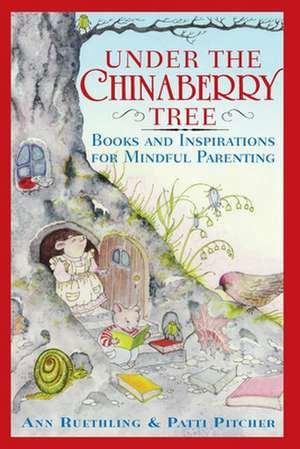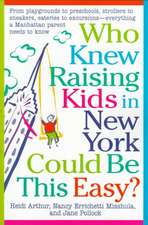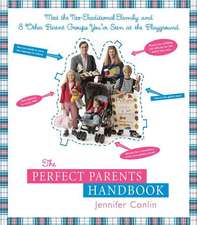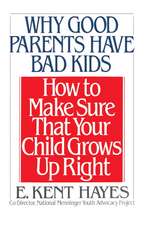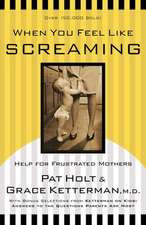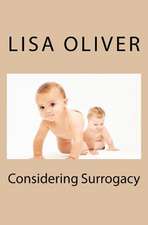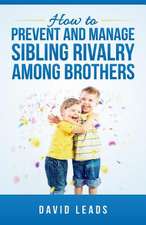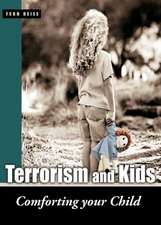Under the Chinaberry Tree: Books and Inspirations for Mindful Parenting
Autor Ann Reuthling, Ann Ruethling, Patti Pitcheren Limba Engleză Paperback – 31 ian 2003
The Chinaberry catalog was created when Ann Ruethling became troubled by the violence in many old-fashioned nursery stories and the poor grammar or mediocre plots in newer children's books. Handpicking a hundred high-quality titles a year, she has become an indispensable friend to thousands of parents, and Chinaberry has become a gold standard for its industry.
Under the Chinaberry Tree celebrates the world of children's books. In warm "one-mother-to-another" prose, Ruethling and her business partner, Patti Pitcher, reflect on the family-first concepts that resonate so strongly with Chinaberry fans and all parents. Exploring the books that have made a difference in their children's lives, the tender experience of reading with children and the moments that make parenting a unique journey, this guide is sure to enrich every family's bookshelf.
Preț: 119.64 lei
Nou
Puncte Express: 179
Preț estimativ în valută:
22.90€ • 23.60$ • 19.33£
22.90€ • 23.60$ • 19.33£
Carte disponibilă
Livrare economică 08-22 februarie
Preluare comenzi: 021 569.72.76
Specificații
ISBN-13: 9780767912020
ISBN-10: 0767912020
Pagini: 320
Dimensiuni: 156 x 236 x 19 mm
Greutate: 0.52 kg
Ediția:1
Editura: BROADWAY BOOKS
ISBN-10: 0767912020
Pagini: 320
Dimensiuni: 156 x 236 x 19 mm
Greutate: 0.52 kg
Ediția:1
Editura: BROADWAY BOOKS
Notă biografică
ANN RUETHLING founded Chinaberry Books Service in 1982 and launched Isabella, a catalog for women, in 1996. A mother of two, she is active in the American Booksellers Association and the Educational Paperback Association. She lives in Spring Valley, California. PATTI PITCHER is Director of Merchandising for Chinaberry and cofounded Isabella with Ruethling. She lives with her husband and four children in Seattle, Washington.
Extras
Dailiness
Making It Through the Day
There is no beyond, there is only here,
the infinitely small, infinitely great
and utterly demanding present.
--Iris Murdoch
When I first became pregnant, I was young and rather naive. I didn't think at all about the changes a child would bring to my day-to-day life. I only knew deep in my heart that I wanted a child and I wanted her now. I didn't think about never-ending diaper changes or crying babies. I didn't wonder about how I would handle the endless sleepless nights a baby could bring or how expensive raising a child would be. It never even crossed my mind that having a baby would change my level of personal freedom. All I knew was that, without a doubt, I was meant to be a mother, and I suppose I just blindly assumed that all of the details would work themselves out in the end. I was right on both counts: I was meant to be a mother and the details did all work themselves out, but it wasn't as easy as that. I had a lot to learn somewhere in the middle.
During about the fifth month of my pregnancy, a near-paralyzing reality hit home: I was going to be a mother. All my pleasant fantasies about the future were replaced by sheer terror. Suddenly, I was no longer so sure this was the right thing for me to be doing, and I was literally left quivering with fear. Was I really up to the challenge of caring for and loving this child? How did you really love a child, anyway? For a few terrible days I considered the awesome responsibilities of being a mother and I was immobilized. And then, quite suddenly, I realized that worrying about all of this was simply too overwhelming. So I decided to stop fretting and went back to the business of being pregnant. Mercifully, I stopped obsessing about the end product of this pregnancy process (i.e., the baby) and started focusing on things like childbirth classes and labor breathing techniques. (Denial is a wonderful thing sometimes.) Time passed, as time always does, and a few months later, my beautiful, wonderful, incredibly divine baby daughter was born. I knew then that without a doubt, I could love my baby enough and that all we had to do was maintain this amazing bond of ours, and all would indeed be fine.
The intensity of my feelings for my daughter came as quite a shock. (Somebody really should have warned me!) I never knew the power of emotion that a child could evoke in a parent. Whether that feeling be anger, fear, protectiveness, love or joy, the sheer magnitude of emotion can be overwhelming. I was lucky: my first response was pure and simple love, so I could just revel in that warmth. But I knew other new mothers (wonderfully caring women) whose first response was terror. Their passion for their baby incited all of their insecurities. What they had wanted the most for years (their baby) was suddenly this all-consuming, almost immobilizing project that they had no idea how to handle. Faced with a pile of dirty diapers and a crying infant, they were reduced to tears (but when faced with an intense, stressful business meeting, they felt comfortable and in control). What they had imagined to be pure joy was transformed overnight into, quite simply, a lot of work and a feeling of incredible helplessness. Negotiating a big contract or planning a conference? A piece of cake. Getting her baby to stop crying? Don't even ask.
How is it that we can love someone so much and have such conflicted feelings? It must be one of those mysteries of being human. The more we feel toward someone, the more we feel--period--regardless of the emotion. Somehow, as parents, we have to learn how to live with all of this contradiction and still let our children know how much we love them. And we have to find a way to accept our children when they are expressing their corresponding mess of emotion toward us, too. "I hate you, Mommy" doesn't mean I hate you forever, but rather "I am angry and want you to know it. If I didn't love you so much I wouldn't be so angry." Parenting is messy. Our love and concern get in the way of being clear, sometimes. And there we are, filled with love and concern, yet not knowing quite what to do.
Now, after over twenty years of mothering, one truth I have come to know is that parenting always involves accepting dualities and finding a balance that works for my family. Day in and day out, I am juggling two ends of many spectrums, trying to find my equilibrium--a place that invariably lies in the middle of the situation. So every lesson I wish to teach my children has a corresponding opposite lesson that must also be learned if they are all to grow into healthy adults.
It isn't enough to teach my children to respect the needs of others if I don't teach them to respect their own needs, too. It isn't enough for them to learn structure and order if they don't also learn to be flexible enough to flow with the challenges life throw their way. It isn't enough to teach my children to save if I also neglect to teach them to give freely. Both ends of these spectrums have value, and I must find a place of balance in between them. We must give and receive. We must have order and flexibility. We must work and play.
It is not unusual for humans to find that they are much more comfortable with one part of any duality, with one end of every spectrum. For instance, creating rhythm in my child's day is easy for me. When Becca and Laura were little, rhythm played an enormous role in my parenting. It was comforting for all of us to know what to expect. Breakfast after we are dressed and have fed the animals; nap directly after lunch; a walk in the afternoon and two stories before bed. We all did well in our comfortable little routine. But then something would inevitably come along that would disrupt our schedule--a late play date, for instance, and naptime was postponed. Or my husband would come home late from work and innocently want to spend time with the kids, thereby disturbing my already initiated bedtime routine.
Suddenly, the kids were cranky and demanding extra attention and I was frustrated because I'd lost control of my day. It took years for me to realize that I needed to embrace flexibility with as much ease as
I embraced rhythm if I wanted my days to flow smoothly. While I thought I had found the answer in predictability (one end of the spectrum), I later came to understand that the answer was in welcoming both ends (flexibility and predictability) equally at different times. The trick then becomes to discern which aspect is needed when. Knowing that I am trying to find balance helps me to question if this is a time to compromise. Or is this a moment to stand firm? Is this a time to stick to the schedule? Or to throw my plans away and give in to the needs of the day?
Every one of us is different. Whatever qualities you express naturally (whether it be flexibility or order, softness or firmness, etc.), it is almost guaranteed that your children will offer you opportunities to develop the opposing trait, too. The kindest, softest parent has need for a firm voice some of the time, just like the firmest parent has need for some softness at some point in the day. What has helped me most in trying to incorporate this concept into my life is the simple word "and." I know I can have rhythm and flexibility. I can set firm boundaries and compromise when necessary. If I pay attention to both sides of the dualities of parenting, I find a comfortable place in the middle, a place where our days flow gracefully (most of the time), and when they don't, we somehow have the perseverance to recover and find our stride the next day (or sometimes maybe not even until the next week).
In the end, the daily tasks of parenting teach us most about ourselves. We will learn some things that come easily to us and some things that we have to work at. If we are open to learning, we will become richer people for our efforts, for the process of parenting will smooth our rough edges and hone our hearts into precise instruments of love that will guide us through our daily lives with grace.
Tips for Having Enough Energy to Survive Daily Life with Small Children
*Be sure to get enough rest. It is so easy to stay up late after the children are in bed to have a few precious hours of solitude. But if this time comes at the expense of your sleep, you and your family will eventually pay a high price for these few hours.
*If mornings are hard for you, make sure you get up before your children. Allow yourself a few minutes to adjust to the day before you are inundated by your children's needs. Have time to take your shower, or drink your morning cup of coffee. Do whatever you need to do to say "Good morning" to yourself. Once you've greeted the day, it is much easier to face the unbounded enthusiasm of a cheery toddler first thing in the morning.
*If your children nap, take that time purely for yourself. Parents need downtime, too. Read a book, take a nap, do something creative--anything to nourish yourself. Don't feel as if you have to make that the most productive hour of the day. Think of this time as your time to renew your batteries, not as the hour to get everything done that hasn't been done all day.
*Eat regular meals. It is so easy to ignore your own needs. When things get hectic or children become overwrought, it can be a challenge to remember to feed yourself. Even if it is just a five-minute break to eat a peanut butter sandwich and drink a glass of milk, sit down. Show your children how to take care of themselves by taking care of yourself.
*Remember to drink plenty of water (not Coke, not coffee--but water). It's amazing how much energy proper hydration provides.
To figure out how much water you require, divide your weight in pounds by two and drink that number in ounces of water. So if you weigh 140 pounds, you need 70 ounces of water, or just about nine eight-ounce glasses. If that sounds like a lot, you probably aren't drinking enough. Try it for a couple of weeks and see how you feel. You might be surprised.
*Plan something fun for yourself every day. This doesn't have to be big or exciting; just a simple act that brings you happiness. For me, it is often a cup of herbal tea on cold afternoons, or a walk outside with the kids--just something for a little break. It doesn't have to take long. Often my walks are only fifteen minutes from start to finish. Choose an activity that is nourishing to you. One of my friends puts her kids in the stroller and walks three blocks every morning for a latte. She's got a houseful (three kids under five), so it is hard for her to find even a moment for herself at home.
The children think the walk is a fun outing and don't have a clue that she is doing this for herself. For her, that latte midway through the walk is a precious reminder that caring for herself is also caring for her children.
*Create a basic rhythm to your day that is tailored to the specific needs of your family. Look at the basic tendencies or habits of your family and create a pattern that supports these needs. There is a tricky balance to be found in meeting your children where they are and in allowing yourself to be true to yourself, too. Are you a night person with a child who rises with the birds? Then maybe you need to take an afternoon nap right along with your child so you can stay up late and still manage to get up early with your child without over-tiring yourself. Does one parent come home late and you still want to eat together as a family? Then plan a regular five-o'clock snack to ensure that your children can make it to a seven-o'clock dinner with ease. Whatever the specific needs of your family, seek a rhythm that works for you--a rhythm that is flexible enough to allow for change and stable enough to provide a comforting structure.
We all experience a normal variety of ups and downs as we move through our ordinary, day-in, day-out lives with children. Here is a collection of books and practical ideas to get you through the day.
Jesse Bear, What Will You Wear?
by Nancy White Carlstrom
Illustrated by Bruce Degen
Jesse Bear, what will you wear?
What will you wear in the morning?
My shirt of red
Pulled over my head
Over my head in the morning.
And so begins Jesse Bear's day. It is one of sunshine, butterflies, sandboxes and family love. The entire story follows Jesse throughout the day, and the lilting verse always asks the same question ("Jesse Bear, what will you wear?"). Whether the answer is "Juice from a pear and rice in my hair, that's what I'll wear at noon!" or "Sleep in my eyes and stars in the skies, moon on my bed and dreams in my head, that's what I'll wear tonight!" there is never a boring moment in Jesse Bear's day.
Children ask for this book again and again. It is a book that families--from child to child, on down the line--read until the book is in shreds. (2-4 yrs.)
Peek-A-Boo!
by Janet and Allan Ahlberg
This is one of those "sleepers" that could sneak by you unless you had a trusted friend to put it in your hand and say it's a book not to be missed. Peek-A-Boo! has been the favorite book of many families with very young children. Catchy, inviting and refreshingly attractive, each double-page spread offers a lot to see. In scenes of a wonderfully untidy and lived-in home, a family goes about its day. And as usual, when there is a baby in the house, their lives revolve around the little one. Die-cut pages on every spread showcase this family's precious youngest, inviting us to turn the page to find out just what's going to be happening in the next scene.
Making It Through the Day
There is no beyond, there is only here,
the infinitely small, infinitely great
and utterly demanding present.
--Iris Murdoch
When I first became pregnant, I was young and rather naive. I didn't think at all about the changes a child would bring to my day-to-day life. I only knew deep in my heart that I wanted a child and I wanted her now. I didn't think about never-ending diaper changes or crying babies. I didn't wonder about how I would handle the endless sleepless nights a baby could bring or how expensive raising a child would be. It never even crossed my mind that having a baby would change my level of personal freedom. All I knew was that, without a doubt, I was meant to be a mother, and I suppose I just blindly assumed that all of the details would work themselves out in the end. I was right on both counts: I was meant to be a mother and the details did all work themselves out, but it wasn't as easy as that. I had a lot to learn somewhere in the middle.
During about the fifth month of my pregnancy, a near-paralyzing reality hit home: I was going to be a mother. All my pleasant fantasies about the future were replaced by sheer terror. Suddenly, I was no longer so sure this was the right thing for me to be doing, and I was literally left quivering with fear. Was I really up to the challenge of caring for and loving this child? How did you really love a child, anyway? For a few terrible days I considered the awesome responsibilities of being a mother and I was immobilized. And then, quite suddenly, I realized that worrying about all of this was simply too overwhelming. So I decided to stop fretting and went back to the business of being pregnant. Mercifully, I stopped obsessing about the end product of this pregnancy process (i.e., the baby) and started focusing on things like childbirth classes and labor breathing techniques. (Denial is a wonderful thing sometimes.) Time passed, as time always does, and a few months later, my beautiful, wonderful, incredibly divine baby daughter was born. I knew then that without a doubt, I could love my baby enough and that all we had to do was maintain this amazing bond of ours, and all would indeed be fine.
The intensity of my feelings for my daughter came as quite a shock. (Somebody really should have warned me!) I never knew the power of emotion that a child could evoke in a parent. Whether that feeling be anger, fear, protectiveness, love or joy, the sheer magnitude of emotion can be overwhelming. I was lucky: my first response was pure and simple love, so I could just revel in that warmth. But I knew other new mothers (wonderfully caring women) whose first response was terror. Their passion for their baby incited all of their insecurities. What they had wanted the most for years (their baby) was suddenly this all-consuming, almost immobilizing project that they had no idea how to handle. Faced with a pile of dirty diapers and a crying infant, they were reduced to tears (but when faced with an intense, stressful business meeting, they felt comfortable and in control). What they had imagined to be pure joy was transformed overnight into, quite simply, a lot of work and a feeling of incredible helplessness. Negotiating a big contract or planning a conference? A piece of cake. Getting her baby to stop crying? Don't even ask.
How is it that we can love someone so much and have such conflicted feelings? It must be one of those mysteries of being human. The more we feel toward someone, the more we feel--period--regardless of the emotion. Somehow, as parents, we have to learn how to live with all of this contradiction and still let our children know how much we love them. And we have to find a way to accept our children when they are expressing their corresponding mess of emotion toward us, too. "I hate you, Mommy" doesn't mean I hate you forever, but rather "I am angry and want you to know it. If I didn't love you so much I wouldn't be so angry." Parenting is messy. Our love and concern get in the way of being clear, sometimes. And there we are, filled with love and concern, yet not knowing quite what to do.
Now, after over twenty years of mothering, one truth I have come to know is that parenting always involves accepting dualities and finding a balance that works for my family. Day in and day out, I am juggling two ends of many spectrums, trying to find my equilibrium--a place that invariably lies in the middle of the situation. So every lesson I wish to teach my children has a corresponding opposite lesson that must also be learned if they are all to grow into healthy adults.
It isn't enough to teach my children to respect the needs of others if I don't teach them to respect their own needs, too. It isn't enough for them to learn structure and order if they don't also learn to be flexible enough to flow with the challenges life throw their way. It isn't enough to teach my children to save if I also neglect to teach them to give freely. Both ends of these spectrums have value, and I must find a place of balance in between them. We must give and receive. We must have order and flexibility. We must work and play.
It is not unusual for humans to find that they are much more comfortable with one part of any duality, with one end of every spectrum. For instance, creating rhythm in my child's day is easy for me. When Becca and Laura were little, rhythm played an enormous role in my parenting. It was comforting for all of us to know what to expect. Breakfast after we are dressed and have fed the animals; nap directly after lunch; a walk in the afternoon and two stories before bed. We all did well in our comfortable little routine. But then something would inevitably come along that would disrupt our schedule--a late play date, for instance, and naptime was postponed. Or my husband would come home late from work and innocently want to spend time with the kids, thereby disturbing my already initiated bedtime routine.
Suddenly, the kids were cranky and demanding extra attention and I was frustrated because I'd lost control of my day. It took years for me to realize that I needed to embrace flexibility with as much ease as
I embraced rhythm if I wanted my days to flow smoothly. While I thought I had found the answer in predictability (one end of the spectrum), I later came to understand that the answer was in welcoming both ends (flexibility and predictability) equally at different times. The trick then becomes to discern which aspect is needed when. Knowing that I am trying to find balance helps me to question if this is a time to compromise. Or is this a moment to stand firm? Is this a time to stick to the schedule? Or to throw my plans away and give in to the needs of the day?
Every one of us is different. Whatever qualities you express naturally (whether it be flexibility or order, softness or firmness, etc.), it is almost guaranteed that your children will offer you opportunities to develop the opposing trait, too. The kindest, softest parent has need for a firm voice some of the time, just like the firmest parent has need for some softness at some point in the day. What has helped me most in trying to incorporate this concept into my life is the simple word "and." I know I can have rhythm and flexibility. I can set firm boundaries and compromise when necessary. If I pay attention to both sides of the dualities of parenting, I find a comfortable place in the middle, a place where our days flow gracefully (most of the time), and when they don't, we somehow have the perseverance to recover and find our stride the next day (or sometimes maybe not even until the next week).
In the end, the daily tasks of parenting teach us most about ourselves. We will learn some things that come easily to us and some things that we have to work at. If we are open to learning, we will become richer people for our efforts, for the process of parenting will smooth our rough edges and hone our hearts into precise instruments of love that will guide us through our daily lives with grace.
Tips for Having Enough Energy to Survive Daily Life with Small Children
*Be sure to get enough rest. It is so easy to stay up late after the children are in bed to have a few precious hours of solitude. But if this time comes at the expense of your sleep, you and your family will eventually pay a high price for these few hours.
*If mornings are hard for you, make sure you get up before your children. Allow yourself a few minutes to adjust to the day before you are inundated by your children's needs. Have time to take your shower, or drink your morning cup of coffee. Do whatever you need to do to say "Good morning" to yourself. Once you've greeted the day, it is much easier to face the unbounded enthusiasm of a cheery toddler first thing in the morning.
*If your children nap, take that time purely for yourself. Parents need downtime, too. Read a book, take a nap, do something creative--anything to nourish yourself. Don't feel as if you have to make that the most productive hour of the day. Think of this time as your time to renew your batteries, not as the hour to get everything done that hasn't been done all day.
*Eat regular meals. It is so easy to ignore your own needs. When things get hectic or children become overwrought, it can be a challenge to remember to feed yourself. Even if it is just a five-minute break to eat a peanut butter sandwich and drink a glass of milk, sit down. Show your children how to take care of themselves by taking care of yourself.
*Remember to drink plenty of water (not Coke, not coffee--but water). It's amazing how much energy proper hydration provides.
To figure out how much water you require, divide your weight in pounds by two and drink that number in ounces of water. So if you weigh 140 pounds, you need 70 ounces of water, or just about nine eight-ounce glasses. If that sounds like a lot, you probably aren't drinking enough. Try it for a couple of weeks and see how you feel. You might be surprised.
*Plan something fun for yourself every day. This doesn't have to be big or exciting; just a simple act that brings you happiness. For me, it is often a cup of herbal tea on cold afternoons, or a walk outside with the kids--just something for a little break. It doesn't have to take long. Often my walks are only fifteen minutes from start to finish. Choose an activity that is nourishing to you. One of my friends puts her kids in the stroller and walks three blocks every morning for a latte. She's got a houseful (three kids under five), so it is hard for her to find even a moment for herself at home.
The children think the walk is a fun outing and don't have a clue that she is doing this for herself. For her, that latte midway through the walk is a precious reminder that caring for herself is also caring for her children.
*Create a basic rhythm to your day that is tailored to the specific needs of your family. Look at the basic tendencies or habits of your family and create a pattern that supports these needs. There is a tricky balance to be found in meeting your children where they are and in allowing yourself to be true to yourself, too. Are you a night person with a child who rises with the birds? Then maybe you need to take an afternoon nap right along with your child so you can stay up late and still manage to get up early with your child without over-tiring yourself. Does one parent come home late and you still want to eat together as a family? Then plan a regular five-o'clock snack to ensure that your children can make it to a seven-o'clock dinner with ease. Whatever the specific needs of your family, seek a rhythm that works for you--a rhythm that is flexible enough to allow for change and stable enough to provide a comforting structure.
We all experience a normal variety of ups and downs as we move through our ordinary, day-in, day-out lives with children. Here is a collection of books and practical ideas to get you through the day.
Jesse Bear, What Will You Wear?
by Nancy White Carlstrom
Illustrated by Bruce Degen
Jesse Bear, what will you wear?
What will you wear in the morning?
My shirt of red
Pulled over my head
Over my head in the morning.
And so begins Jesse Bear's day. It is one of sunshine, butterflies, sandboxes and family love. The entire story follows Jesse throughout the day, and the lilting verse always asks the same question ("Jesse Bear, what will you wear?"). Whether the answer is "Juice from a pear and rice in my hair, that's what I'll wear at noon!" or "Sleep in my eyes and stars in the skies, moon on my bed and dreams in my head, that's what I'll wear tonight!" there is never a boring moment in Jesse Bear's day.
Children ask for this book again and again. It is a book that families--from child to child, on down the line--read until the book is in shreds. (2-4 yrs.)
Peek-A-Boo!
by Janet and Allan Ahlberg
This is one of those "sleepers" that could sneak by you unless you had a trusted friend to put it in your hand and say it's a book not to be missed. Peek-A-Boo! has been the favorite book of many families with very young children. Catchy, inviting and refreshingly attractive, each double-page spread offers a lot to see. In scenes of a wonderfully untidy and lived-in home, a family goes about its day. And as usual, when there is a baby in the house, their lives revolve around the little one. Die-cut pages on every spread showcase this family's precious youngest, inviting us to turn the page to find out just what's going to be happening in the next scene.
Recenzii
"Many across America now think of Ruethling as the fairy godmother of children's books."
-Chicago Tribune
-Chicago Tribune
Descriere
Celebrating the 20th anniversary of the Chinaberry children's book catalog, which has become a gold standard for its industry, the women behind America's beloved catalog share their wisdom about the joys of children's literature and parenting.
